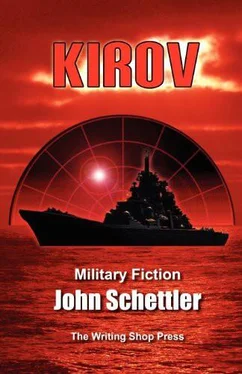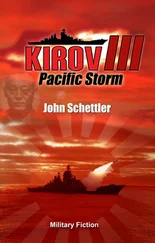John Schettler - Kirov
Здесь есть возможность читать онлайн «John Schettler - Kirov» весь текст электронной книги совершенно бесплатно (целиком полную версию без сокращений). В некоторых случаях можно слушать аудио, скачать через торрент в формате fb2 и присутствует краткое содержание. Жанр: Фантастика и фэнтези, Альтернативная история, на английском языке. Описание произведения, (предисловие) а так же отзывы посетителей доступны на портале библиотеки ЛибКат.
- Название:Kirov
- Автор:
- Жанр:
- Год:неизвестен
- ISBN:нет данных
- Рейтинг книги:5 / 5. Голосов: 1
-
Избранное:Добавить в избранное
- Отзывы:
-
Ваша оценка:
- 100
- 1
- 2
- 3
- 4
- 5
Kirov: краткое содержание, описание и аннотация
Предлагаем к чтению аннотацию, описание, краткое содержание или предисловие (зависит от того, что написал сам автор книги «Kirov»). Если вы не нашли необходимую информацию о книге — напишите в комментариях, мы постараемся отыскать её.
Kirov — читать онлайн бесплатно полную книгу (весь текст) целиком
Ниже представлен текст книги, разбитый по страницам. Система сохранения места последней прочитанной страницы, позволяет с удобством читать онлайн бесплатно книгу «Kirov», без необходимости каждый раз заново искать на чём Вы остановились. Поставьте закладку, и сможете в любой момент перейти на страницу, на которой закончили чтение.
Интервал:
Закладка:
He spotted a small anemometer, spinning over the crumbled ruins to measure wind speed along with a wind sock, and quickly made his way to the rickety lean-to, seeing a third man there, which he placated with a friendly smile, as he snapped off photos. The man gave him an incredulous look, and Troyak, having searched the first two men, was soon at Fedorov’s side to fish into the pockets of this last man. He handed Fedorov a small dog-eared notebook, and the navigator also noticed a newspaper folded between two pieces of antiquated weather equipment, a barometer and a stolid wooden box which he took to be a hygrometer to measure the moisture in the air.
Again, it was what he did not see that set his mind racing. If this was a field post set up for special measurements, there was no modern equipment here, no satellite phones, digital gauges or monitors, no wireless equipment, though he did see what looked like an old tube-style radio set, which he photographed. There were no ultraviolet sensors or radiation detectors either. He reached for the newspaper, tucking it quickly into his parka, then pulled out two chocolate bars and a pack of cigarettes and handed them to the dumbfounded Norwegian in compensation. Two more photos of the equipment and he had all he needed to find here.
“Let’s go,” he said to the Sergeant, “I want to look for the main facility.” He nodded warmly to the Norwegians and ran back to the helo.
Troyak’s men slipped back, two by two, until the Sergeant boarded last, eying the Norwegians darkly as he did so. He had taken the man’s rifle as well. A moment later the KA-226 revved up its twin rotors and rose in a swirl of wind, ascending quickly and then angling speedily off to the south. Fedorov looked back, seeing the three Norwegians clustered together as they left, pointing and talking amongst themselves, and he waved with a wry smile.
They continued searching for some time, yet saw no sign of any other building or installation on the pan-handle. Fedorov had a map detailing the locations of the modern day airfield, roads and ‘Olonkin City,’ as it was called which was really just a scattering of ten to twelve linked buildings. Nothing was there.
“Where is the weather station?” said Orlov.
“It should be right there,” Fedorov pointed to an empty stretch of land near southernmost end of the lowland flats between the two more elevated segments of the island.
“Are you sure you have the right place?”
“I'm a navigator, Mister Orlov,” said Fedorov. “I can read a map.”
“You can’t tell me NATO has hidden this facility just for this exercise. What is going on here?”
They flew down as far as Kapp Wein, Cape Vienna as it was called, with its distinctive off-shore rock formations. “Let’s get home,” said Fedorov. “There’s nothing more to see here and the weather isn’t getting any better. May I use the radio, sir? The Admiral ordered me to report as soon as we concluded our investigation.” He was looking with great interest on the identity card the Siberian sergeant had taken from one man. It was an old style card, unlaminated, with no barcode or digital tape to be scanned, and no hologram for security. It was just a typewritten card, and from the looks of it an old style typewriter had been used. The name was Ernst Ullring.
“Very well,” said Orlov. “Pilot, take us back to Kirov.”
Fedorov was on the radio at once. He had little to say, as the Admiral had given him clear instructions.
“You see this book you lent me?” the Admiral had said to his navigator. “You need only tell me whether I should be wasting my time with it or not.”
Fedorov was to use an encrypted channel and he spoke a few brusque sentences. “Scout one reporting, repeat. Scout one reporting. You may wish to do some further reading, sir. We are inbound now, ETA 0400 hours.”
Part IV
“The cleverest of all, in my opinion, is the man who calls himself a fool at least once a month.”
— Fyodor DostoevskyChapter 10
Admiral Volsky had assembled all his key officers in the wardroom, with the bridge being manned by substitute watch standers. He sat at the head of the briefing table, his eyes on the video monitor, watching the playback that had been recorded during the overflight of the island. From time to time he would stop, and ask Orlov if this footage was indeed what he had seen. The chief nodded grimly in the affirmative.
As the video concluded, the Admiral closed his eyes briefly, rubbing a spot at his temple, then looked up at his officers and spoke in a quiet, firm voice.
“Gentlemen, from this footage it is clear to me that the meteorological station on the island is obviously missing. There is no evidence of the station facilities at any of the locations investigated, and the Loran-C antennas are missing as well.”
“Yet we did see signs of impact craters on the ground there, sir,” said Orlov. “It looked to me as if the site had been bombed or shelled. Perhaps we are at war and we have put in an air strike on NATO installations there-wiped them out!”
“These were fairly large facilities,” said the Admiral. “Did you see any evidence of wreckage? Even if these facilities had been destroyed, there would be some sign of wreckage or debris.”
“Nothing other than the impact craters we noted, sir. But the site itself seemed reconstructed from damaged metal beams and scorched wood planks.”
“Fedorov tells me this is exactly what the weather station looked like in 1941. And there was no sign of the roads that were constructed on the island after the war, nor the airfield.” The admiral tapped at one of Fedorov’s maps of the island clearly indicating these major features. “Where did they go?”
The silence around the table was profound. The men looked at one another, some wearing confused expressions, others noting the reaction of key officers, particularly Karpov and Orlov. The Admiral could clearly see that only Karpov seemed to fidget uncomfortably, the man’s restless eyes clearly revealing that he was unwilling to grasp the obvious facts they were now reviewing.
“Now,” said Volsky, “please note this photograph Mister Fedorov was kind enough to retrieve from one of his history books.” He smiled, passing a photocopy of the image around the table for the officers to review. It clearly showed the ragged bare metal beamed roof and lean-to where the helicopter had set down, as well as the piles of black volcanic rock that had been stacked into a makeshift wall at one end of the site. Then he pointed to the screen again where an image was displaying that had been taken by Fedorov's digital camera, just minutes ago. The two images were remarkably similar.
“If my eyes do not deceive me, gentlemen,” said the Admiral, “then what we are seeing in that digital photograph is a near replica of the weather station on this island as it appeared in April of 1941. As to the effects confiscated from the three Norwegians present, Mister Fedorov was able to identify one of these men. The Admiral nodded to his navigator.
“Ernst Ullring,” said Fedorov. “This man was a leader of a twelve man team from Norway which landed on March 10, 1941. Now I will read from one of my history volumes, Great World War II battles in the Arctic, by Mark Llewellyn Evans. He clearly states: ‘Once they were set up, they began sending regular weather reports every three hours, which the Germans quickly intercepted. The Luftwaffe decided to obliterate the island and launched a raid from their airfields in Norway. The German bombers streaked in low and pounded the weather station but did nothing but stir up a little lava dust. Neither the station nor the men were even scratched. Unknown to the Germans, the weathermen relied on a very sophisticated early warning system: their Norwegian huskies heard the approaching Luftwaffe engines long before their masters did, and the dogs’ barking alerted the men in time to reach shelter.’ This explains the impact craters we observed, and the dog.”
Читать дальшеИнтервал:
Закладка:
Похожие книги на «Kirov»
Представляем Вашему вниманию похожие книги на «Kirov» списком для выбора. Мы отобрали схожую по названию и смыслу литературу в надежде предоставить читателям больше вариантов отыскать новые, интересные, ещё непрочитанные произведения.
Обсуждение, отзывы о книге «Kirov» и просто собственные мнения читателей. Оставьте ваши комментарии, напишите, что Вы думаете о произведении, его смысле или главных героях. Укажите что конкретно понравилось, а что нет, и почему Вы так считаете.












